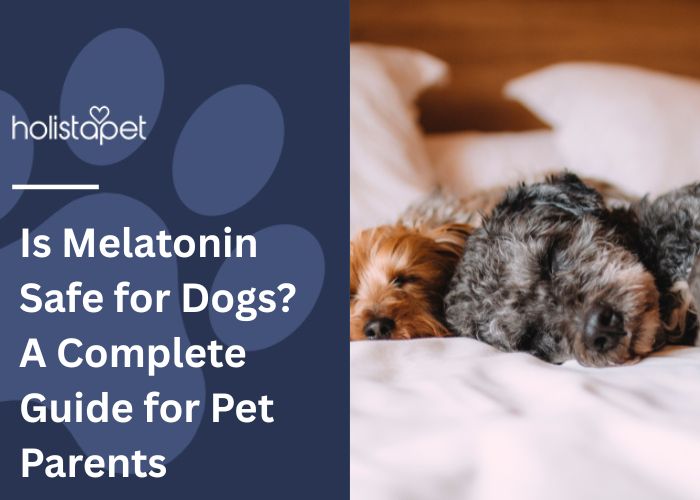Is melatonin safe for dogs? For most pups, it can be, as long as you stick to the proper dosage and get your vet's approval first. This tiny hormone plays a big role in your pet's sleep-wake cycles and can even help with anxious behaviors or seasonal hair loss.
With the right melatonin supplements and a little know-how, you can give your dog safe, gentle support for calmer nights and more restful sleep. Ready to learn more?
What Is Melatonin?

Melatonin is a naturally occurring hormone made by the pineal gland in the brain. It helps regulate sleep cycles, also called circadian rhythms, telling the body when it's time to rest and when it's time to be alert. Your dog's brain produces more melatonin in the dark and less during daylight hours.
Melatonin supplements mimic this natural process to help balance sleep patterns. They can also help ease anxious behaviors or support seasonal hair growth. This makes supplemental melatonin a versatile option for canines with certain sleep problems or skin concerns.
Natural vs. Synthetic Melatonin
Natural melatonin comes from animal or plant sources, while synthetic melatonin comes from labs. Both aim to copy the effects of the hormone your pup's body already produces. The main difference is how they're sourced, not how they work.
Most melatonin supplements for dogs use the synthetic form. It's consistent, easy to measure, and widely available as an over-the-counter supplement. Always check the label to avoid harmful additives like xylitol, which can be dangerous for canine pets.
Related Post: Can Dogs Have Melatonin Gummies
Is Melatonin for Dogs Safe?

In most cases, melatonin for dogs is safe when given in the correct dosage and under a vet's guidance. It works with your dog's natural cycles and may help in situations like nervous behaviors, sleep issues, or seasonal shedding.
Safety depends on using the right product and avoiding certain additives. Always choose melatonin products made for pets and double-check ingredients to keep your dog's health protected.
Related Post: Pros and Cons of Melatonin for Dogs
Vet-Approved Uses for Melatonin in Dogs
Vets may recommend melatonin supplements for a variety of reasons. It can support dogs suffering from sleep disturbances, anxious behaviors, or seasonal flank alopecia. Some vets also prescribe melatonin for canines with Cushing's disease to help manage cortisol levels.
The goal is to work with your pet's natural rhythms. By matching the product to their specific needs, melatonin supplementation can be a gentle, supportive tool in their overall care plan.
Is Human Melatonin Safe To Give Dogs?
Human-specific melatonin can be safe for dogs, but only if it's free from harmful additives like xylitol or certain artificial sweeteners. The dosage must also match your pet's weight and needs, not the amount listed for people.
Before giving your dog melatonin intended for humans, check the label carefully and speak with your vet. This helps make sure your pooch gets the benefits without the risk of unwanted side effects.
Situations Where Caution Is Needed
Melatonin may not be right for every dog. Pregnant or nursing dogs, puppies, or pups on certain medications should only take melatonin with a vet's approval. Pets with medical conditions like diabetes or clotting disorders may also need to avoid it.
If your pooch shows unexpected changes in behavior, appetite, or energy after starting melatonin, stop giving it and contact your vet. A cautious approach keeps your furry friend safe while exploring new supplements.
Common Uses of Melatonin for Dogs
Melatonin offers support in several everyday situations for dogs. Many owners use it as part of a gentle, holistic routine to keep their pets feeling balanced and comfortable. Here's how you might use melatonin for your pup:
-
Promoting Calm and Relaxation. Helps anxious dogs settle during loud noises, travel, or other stressful events.
-
Supporting Restful Sleep. It's a natural sleep aid that encourages more consistent sleep patterns for pups with disturbances.
-
Seasonal Shedding and Skin Support. May aid the growth of hair follicles and boost skin comfort during seasonal changes.
HolistaPet Melatonin Chews for Dogs

HolistaPet's Melatonin Soft Chews offer a gentle, all-natural way to help calm dogs with sleep or mood issues. We do this by blending melatonin with soothing botanicals like chamomile, valerian root, and passion flower for a relaxing effect.
Dogs love the natural flavor, making them easy to give without fuss. Each bag holds 30 treats, giving pet parents a simple, reliable way to support their canine companion's comfort and well-being.
See more calming options for dogs here
Recommended Melatonin Dosage for Dogs
The right melatonin dosage depends on your dog's weight and needs. Smaller breeds may only need 1 mg, while larger breeds can require higher amounts. In most cases, vets recommend giving it once or twice daily, but always follow their guidance.
For a detailed breakdown of how much melatonin to give by size and frequency, check our melatonin dosage guide for dogs. Sticking to the recommended dosage helps avoid unwanted side effects while giving your dog the best results.
Potential Melatonin Side Effects in Dogs
Most dogs handle melatonin dietary supplements well, but mild side effects can happen. These might include drowsiness, upset stomach, or slight changes in appetite. Some dogs may also experience temporary disorientation.
If you notice anything unusual, keep track of when it happens and how your pet responds. This information can help your vet decide whether to adjust the dosage or stop supplementation.
When To Stop and Call the Vet
Stop melatonin supplementation and call your vet if your dog shows persistent vomiting, extreme lethargy, or sudden behavior changes. These signs may mean the product isn't agreeing with them. It's also important to seek advice if your pet is on other medications, as melatonin can interact with certain treatments. Keep in mind: Quick action keeps small issues from turning into bigger problems.
How To Give Melatonin to Dogs

Melatonin for dogs comes in tablets, soft chews, and liquid forms. Choose the one that's easiest for your pooch to take and matches the dosage your vet recommends. You can administer melatonin with or without food, depending on your dog's preference and tolerance. Just keep the timing consistent to support steady cycles and calming effects.
Can Puppies Have Melatonin?
Puppies can sometimes take melatonin, but only under direct veterinary supervision. Their bodies are still developing, so you and your vet must handle dosage and timing with extra care. Always confirm safety and dosage with your vet before starting your puppy on melatonin.
Can Melatonin Be Taken With Other Supplements or Medications?

Melatonin can interact with certain medications, including those for seizures, blood pressure, or hormone regulation. Combining it with other calming supplements may also amplify its effects.
To avoid unwanted reactions, share your dog's full supplement and medication list with your vet. This helps make sure melatonin is safe and works well with the rest of your pet's care plan.
FAQs – Melatonin and Dogs
Dog owners often have questions before adding melatonin to their furry friend's routine. It's smart to learn how quickly it works, how often you can give it, and what effects to expect. The following answers cover common concerns, so you can make informed choices. Keep reading to learn more!
How long does it take for melatonin to work in dogs?
Melatonin usually starts working within 15 to 30 minutes after your pup takes it. The timing can vary based on their size, metabolism, and whether they ate recently. For anticipated stressful events like fireworks or travel, administer melatonin ahead of time, so it's active when needed. Consistent timing helps your pooch get the most benefit from each dose.
Can I give my dog melatonin every night?
You can give melatonin nightly if your vet recommends it and the dosage is correct for your pet's weight. Many dogs take melatonin regularly for ongoing sleep issues or anxious behaviors. Regular check-ins with your vet keep the routine safe and beneficial.
Will melatonin make my dog groggy?
Melatonin can make some pups a bit drowsy, especially after the first few doses. This effect usually lessens as their body adjusts to the supplement. If your dog seems overly tired or sluggish, talk to your vet about adjusting the dosage. Finding the right balance keeps your buddy calm without making them too sleepy.
How do I know if my dog needs melatonin?
Signs your dog may benefit from melatonin include trouble sleeping, anxious behaviors during loud events, or seasonal hair loss. Some canines also struggle with restlessness at night or during travel. A vet can confirm if melatonin is a good choice and suggest the right dosage.
Final Thoughts – Using Melatonin Safely for Your Dog
Melatonin can be a safe, gentle way to support your dog's sleep cycles, calm their anxious behaviors, and look out for their seasonal skin health. The winning combo is choosing a product made for pets and following your vet's dosage advice.
HolistaPet's Melatonin Chews give doting pet owners like you an easy, natural option pups truly enjoy. With the right approach, melatonin can become a trusted tool for keeping your best friend relaxed, rested, and feeling their best.
Learn how melatonin supports dog care and whether it’s safe for your pup’s needs.


 CBD Oil for Dogs - Fast Acting
CBD Oil for Dogs - Fast Acting
 Chicken Flavored CBD Oil For Dogs - Easy Dose
Chicken Flavored CBD Oil For Dogs - Easy Dose
 Salmon Flavored CBD Oil For Dogs - Highly Rated
Salmon Flavored CBD Oil For Dogs - Highly Rated
 CBG Oil for Dogs and Cats - Loved by Thousands
CBG Oil for Dogs and Cats - Loved by Thousands





Leave a comment
All comments are moderated before being published.
This site is protected by hCaptcha and the hCaptcha Privacy Policy and Terms of Service apply.